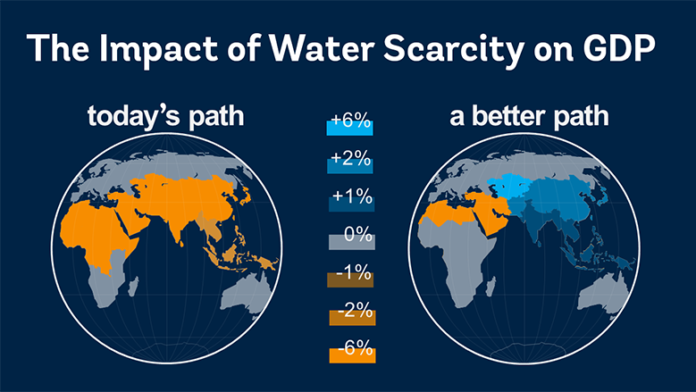Water scarcity, exacerbated by climate change, could cost some regions up to 6 percent of their gross domestic product (GDP), spur migration, and spark conflict, according to a new World Bank report.
High and Dry: Climate Change, Water and the Economy, says the combined effects of growing populations, rising incomes, and expanding cities will see demand for water rising exponentially, while supply becomes more erratic and uncertain.
“We decided to produce this report as we recognised that many of the impacts of climate change are channelled through water, and that the current situation is troubling and might get worse,” Richard Damania, Lead Economist at the World Bank and author of the report, told The Source. “This is likely to have economic impacts but we had no idea of how and in what ways and what magnitude.”
Unless action is taken soon, the report says, water will become scarce in regions where it is currently abundant, such as Central Africa and East Asia, and scarcity will greatly worsen in regions where water is already in short supply, such as the Middle East and the Sahel in Africa. These regions could see their growth rates decline by as much as 6 percent of GDP by 2050 due to water-related impacts on agriculture, health, and incomes.
The report also warns that reduced freshwater availability and competition for other uses, such as energy and agriculture, could reduce water availability in cities by as much as two-thirds by 2050, compared to 2015 levels.
“Depending on the measure used, between 1 and 4 billion (60 percent of humanity) people live in areas with water scarcity,” added Damania. “The higher figure arises when we take account of environmental flows that are essential to sustain river health and deltas. So going forward the equation is simple: We are converging upon a world where water supplies are diminishing in some places while demand is rising due to growing populations and increased irrigation. The result is a water deficit that can act as a head wind on economic performance.”
The negative impacts of climate change on water could be neutralised with better policy decisions, with some regions starting to improve their growth rates by up to 6 percent with better water resource management.
In the world’s extremely dry regions, stronger policies and reforms are needed to cope with deepening climate stresses.
“There is a silver lining,” said Damania. “When governments respond to water shortages by boosting efficiency and allocating even 25 percent of water to more highly valued uses, losses decline dramatically and for some regions may even vanish. Improved water stewardship pays high economic dividends.”








